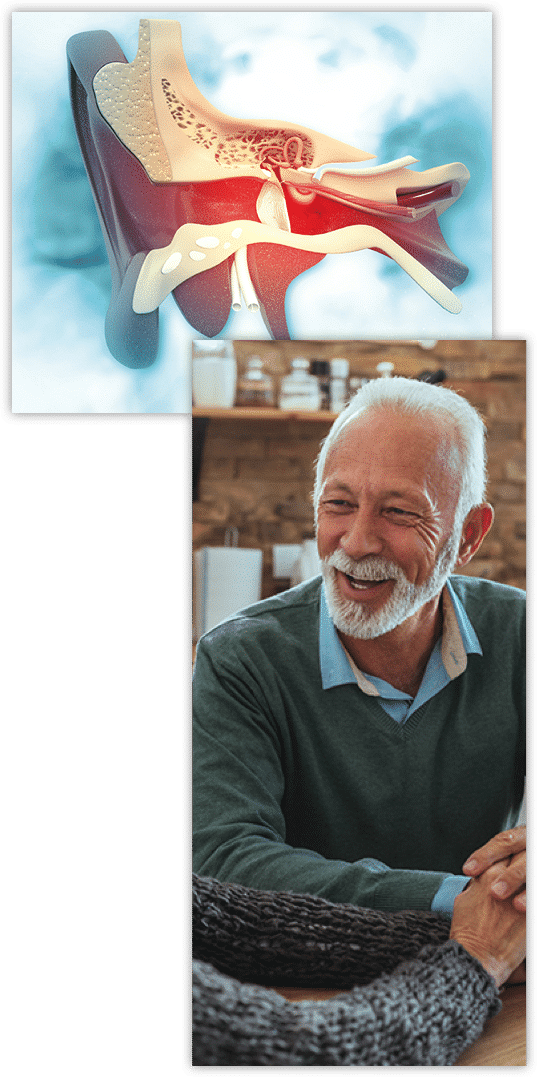The ear is a surprisingly complex organ responsible for not only collecting and processing sounds and transmitting them to the brain for interpretation, but is also crucially involved in making sure your balance and motor skills are in synch. Many take hearing for granted, but understanding the process is the key to treating hearing loss.
Parts of the Ear and Their Functions
The ear consists of three sections: the outer ear, middle ear and inner ear. Each plays an important role in hearing.
Outer Ear Function
The outer ear is called the auricle or pinna. It is the external portion visible to others and is responsible for collecting sound waves and funneling them into the ear canal. There, they are amplified and sent to the tympanic membrane (eardrum), causing it to vibrate.
Middle Ear Function
The middle ear is the area between the ear drum and the inner ear. When the eardrum vibrates, it stimulates movement of the ossicles, a trio of tiny bones comprised of the malleus (hammer), incus (anvil) and stapes (stirrup). The stapes attaches to the oval window, which connects the middle and inner ears.
Inner Ear Function
The inner ear is comprised of the vestibule, the semicircular canals and the cochlea. The cochlea is a fluid-filled structure which convert the vibrations of the ossicles into fluid waves. The fluid waves stimulate the hair cells in the cochlea. The hair cells then convert the fluid waves into electrical impulses that traverse the auditory nerve to the brain. There, they are interpreted as sound and the hearing process is complete.

Common Conditions that Affect the Ear:
Earache: Commonly caused by infection, poor Eustachian tube function, or temporomandibular joint problems (TMJ), earaches can also be caused by everything from ear trauma, perforated eardrum, sinus infection, sudden changes in pressure and excess buildup of earwax to shampoo or water in the ear.
Earwax Blockage: Earwax (cerumen) is a yellowish waxy substance produced by healthy ears. Earwax protects the ear from bacteria, water and foreign particles. It also assists in the cleaning and lubrication of the ear canal. Usually, excess wax is removed from the ear canal naturally. If a buildup does occur, the earwax will become hard and block the ear.
Cholesteatoma: An abnormal skin growth in the middle ear behind the eardrum that may also affect the mastoid (skull bone), cholesteatomas begin as cysts and gradually increase in size, destroying the bones of the middle ear and causing hearing loss.
Ear Infections: Occurring in the outer or middle ear, infection in the middle ear happens when fluid becomes trapped following viral or bacterial infection, while dry/cracked skin in the outer ear is usually to blame for outer ear infections. And either can be acute (short duration) or chronic (persistent).
Eardrum Perforation: Defined as a hole or rupture in the eardrum and known medically as a tympanic membrane rupture, perforations occur in the membrane separating your outer ear from your inner ear. A perforation can lead to a middle ear infection and possible hearing loss, though in many cases it will heal on its own without medical treatment.
Otosclerosis: Otosclerosis is an abnormal growth of bone in the middle ear that causes hearing loss. It typically begins in the early 20s, and is the leading cause of middle ear hearing loss in young adults.
How are Ear Conditions Diagnosed?
ENT doctors use a variety of methods to diagnose ear conditions, including lighted otoscopic tools, symptom-related testing and more technically advanced methods such as tympanometry (measuring the movement of the eardrum) and acoustic reflectometry (measuring sound reflecting back to the eardrum) among myriad other measures.
We’re Listening and We Want to Help.
Though every diagnosis always starts with your individual needs. Patient care begins with the patient, and every diagnosis starts with a conversation. We want to know what brought you in, how you feel both physically and mentally, when your symptoms began and what environmental factors may have had an impact.
Schedule an Evaluation
For a medical emergency, please call 911.
To request an appointment or connect with our team, please call (256) 571-8450.